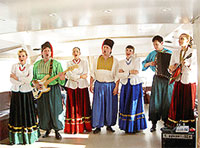Facilitating Learning Russian

Date: Sun, 21 Jul 2013
Subject: Facilitating Learning Russian
From: Ron Pope <ron42.pope@gmail.com>
The current (July 29) issue of Time magazine has an article entitled “The Power of the Bilingual Brain” that presents a powerful case for encouraging every child with a connection to Russia — the children of emigres and adopted Russians – -to learn what could have been their native language — not just learn English. Research indicates that the brains of people who know more than one language work more effectively than those who know only one language and work effectively longer. For example, reportedly bilinguals who eventually develop Alzheimer’s do so an average of 5.1 years later than monolinguals.
This is of course in addition to the value of developing “cultural intelligence,” particularly an understanding of the nature and significance of cultural differences.
The best place to learn Russian is of course in Russia. But there is a catch for any child who was born in Russia. He or she either needs to get a Russian passport or officially renounce their Russian citizenship in order to be able to get a Russian visa with an American passport.
The ideal solution is to get a Russian passport — and have dual citizenship. But this means that the adopted child who is 18 or older has to go to the nearest Russian Consulate.
I’m not sure what the situation is for the other Russian Consulates, but the one in Seattle has proven to be extremely difficult to contact by a family whose adopted daughter wants to travel to Russia. Comments on the Internet suggest that this is an ongoing problem.
If anyone can facilitate contacting the Seattle Consulate, their assistance will be very much appreciated.
Ron Pope, PhD
Founder & President
Serendipity-Russia
(The America Home)
www.serendipity-russia.com
(309) 454-2364
Skype name: ron.pope67
